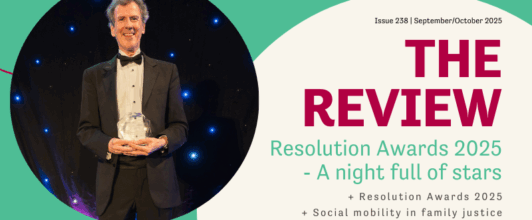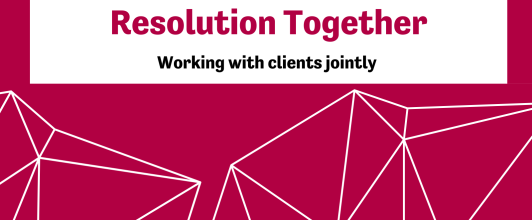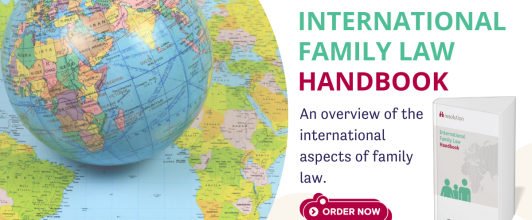
The Review
The Review is Resolution's bi-monthly magazine for members. Publishing six times a year with a mix of features, law and practice and news from the regions.
Broad range of information for professionals and practitioners in family law and justice.
Showing 61 - 80 of 518

The Review is Resolution's bi-monthly magazine for members. Publishing six times a year with a mix of features, law and practice and news from the regions.

Resonate is a new blog from Resolution, bringing together voices from across family law to share insight, experience and both personal and professional perspectives
As part of Resolution's Code of Practice members are asked to use the Good Practice Guides as part of their day to day work. These represent Resolution's core values and are designed to offer knowledge and guidance to our members.

Resolution Together is a way of working that allows lawyers to work with and advise couples jointly, including providing appropriate legal advice, through a divorce or separation.

Find resources on mediation, collaborative practice, arbitration and more.

This list of recommendations of family lawyers in other jurisdictions has been compiled by the members of Resolution's International Committee based on their working experience. The lawyers on this list are not Resolution members - unless indicated - and as such are not endorsed or recommended by Resolution.
Welcome to your February 2023 edition of the Legal Aid newsletter from Resolution.
Written correspondence, such as emails or letters, is still the main method of communication in family disputes. The impact of letters and emails can be significant; therefore, consider who the recipient is and what you hope to achieve with the communication.
Welcome to your January 2023 edition of the Legal Aid newsletter from Resolution.
For every issue of The Review we will be publishing the articles here in the Knowledge and Resources section of our website as well as the pdf of the printed version.
Welcome to your December 2022 edition of the Legal Aid newsletter from Resolution.
Resolution’s response to the Public Law Working Group
This guide is intended to assist practitioners in advising clients on when expert evidence is required, and instructing the expert in such a way as will be of maximum benefit to the client in assisting them, or the court, in reaching a resolution of a matter in dispute between the parties.
Service of documents is a particularly sensitive area. It is sometimes essential that documents are served upon the other party personally, but this could inflame the situation and be counterproductive to the aims and ethos of the Resolution Code of Practice.
This guide looks at the issues and ways in which service of documents can be achieved in a constructive way, in order to avoid increasing the acrimony between the parties.
One of the most important aspects of a family lawyer's job is to draft documents on behalf of clients. The documentation can take many different forms and it is often these documents that are pivotal in resolving disputes between parties, whether at a court hearing or in negotiations.
The Guides to Good Practice build on the Code of Practice by developing the ethos behind it into areas of practice. This guide focuses on referrals to contact centres and the best practice needed in these cases.
Welcome to your November edition of the Legal Aid newsletter from Resolution.
Resolution is committed to embracing and adopting an anti-racism approach and a commitment to being an anti-racist organisation.
The object of all dispute resolution is to clarify facts and narrow issues. The use of experts may be considered in child-related situations, including proceedings. Those involved in assisting parties, including the court, may be helped by an expert’s findings in relation to injuries or medical complaints, psychological problems including attachments, or even how children have reacted in a supervised contact centre.
Resolution Together is a way of working that allows lawyers to work with and advise couples jointly, including providing appropriate legal advice, through a divorce or separation.
Legal Aid Committee member Nicola Jones-King and legal aid consultant, Vicky Ling, share hints and tips about how to approach your next legal aid audit.
Resolution’s 6,500 members are family lawyers and other family justice professionals, committed to a non-adversarial approach to family law and the resolution of family disputes. Resolution members abide by a Code of Practice which emphasises a constructive and collaborative approach to family problems and encourages solutions that take into account the needs of the whole family and the best interests of any children in particular. We also campaign for better laws and better support and facilities for families and children undergoing family change.
Resolution’s response to the Family Procedure Rule Committee
This is the monthly legal aid briefing for Resolution members.
Resolution's Cohabitation Committee hosted a presentation that delved into the formation and breakdown of Muslim marriages, particularly for those couples who have not formally married, often unwittingly.
This is the monthly legal aid briefing for Resolution members.